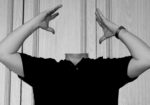A Shocking Discovery
My husband and I were in the car to make our weekly grocery run. Schumann- he said in response to the in progress piece on the radio. Fantasiestucke- I said. We were talking and not really listening but gradually I realized that there was, in the vernacular, a whole lotta note splitting goin’ on.
What happened as the pieces progressed (we heard Grillen & In der Nacht) shocked me. Not the split notes—my reaction to them. I tried to rationalize. Perhaps it was a live performance? The coughs proved this theory correct. I twisted in my seat and wished I was anywhere else. I wanted to yell loudly- that’s not how it goes! I had to restrain myself from sighing and changing the radio station.
It was sheer torture. The good pianist on my right shoulder tried to maintain control. Listen to the performance and what is being said not to the missed notes- she said. Full of schadenfreude, the evil pianist on my left said- did you hear that one???
I have counseled my students (sometimes every week) to avoid the trap of blind perfectionism. Be who you are now- I tell them. Perfection comes rarely and mostly when we cease pursuing it. We are human and we make mistakes; perfection comes from the cutting room floor- I tell them.
I have fought the good fight in my presentations & workshops and even wrote a recent blog post against perfectionism (It Sounded Better at Home). So why did I have such a loathsome reaction to this particular performance? Was it simply because of the situation—in a car midway through the piece? Or, is the perfection of TV and other recorded mediums simply too deep seated to ever truly be overcome–overwritten?
It turned out that the performance was by the great Artur Rubinstein. I am aware of a recording of the Fantasiestucke which was released by RCA without his permission. Could this have been the performance we heard? Overall, should it really matter? How can I help my students if I cannot see the mote in my own eye?
My deepest apologies to you Artur.


